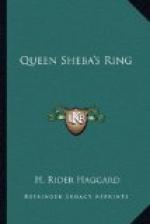At last, after superhuman efforts, the mine was finished. Our stock of concentrated explosive, about four full camel loads of it, was set in as many separate chambers, each of them just large enough to receive the charge, hollowed in the primaeval rock from which the idol had been hewn.
These chambers were about twenty feet from each other, although if there had been time to prolong the tunnel, the distance should have been at least forty in order to give the stuff a wider range of action. According to Oliver’s mathematical reckoning, they were cut in the exact centre of the base of the idol, and about thirty feet below the actual body of the crouching sphinx. As a matter of fact this reckoning was wrong in several particulars, the charges having been set farther toward the east or head of the sphinx and higher up in the base than he supposed. When it is remembered that he had found no opportunity of measuring the monument which practically we had only seen once from behind under conditions not favourable to accuracy in such respects, or of knowing its actual length and depth, these trifling errors were not remarkable.
What was remarkable is that his general plan of operations, founded upon a mere hypothetical estimate, should have proved as accurate as it did.
At length all was prepared, and the deadly cast-iron flasks had been packed in sand, together with dynamite cartridges, the necessary detonators, electric wires, and so forth, an anxious and indeed awful task executed entirely in that stifling atmosphere by the hands of Orme and Quick. Then began another labour, that of the filling in of the tunnels. This, it seems, was necessary, or so I understood, lest the expanding gases, following the line of least resistance, should blow back, as it were, through the vent-hole. What made that task the more difficult was the need of cutting a little channel in the rock to contain the wires, and thereby lessen the risk of the fracture of these wires in the course of the building-up process. Of course, if by any accident this should happen, the circuit would be severed, and no explosion would follow when the electric battery was set to work.
The arrangement was that the mine should be fired on the night of that full moon on which we had been told, and spies confirmed the information, the feast of the marriage of Barung’s daughter to my son would be celebrated in the city of Harmac. This date was fixed because the Sultan had announced that so soon as that festivity, which coincided with the conclusion of the harvest, was ended, he meant to deliver his attack on Mur.
Also, we were anxious that it should be adhered to for another reason, since we knew that on this day but a small number of priests and guards would be left in charge of the idol, and my son could not be among them. Now, whatever may have been the views of the Abati, we as Christians who bore them no malice did not at all desire to destroy an enormous number of innocent Fung, as might have happened if we had fired our mine when the people were gathered to sacrifice to their god.




